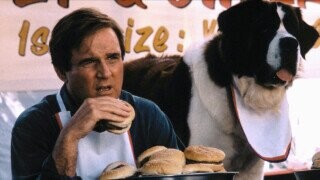Charles Grodin Is So Good at Comedy He Actually Made ‘Beethoven’ Watchable

The path to adulthood is lined with various milestones; getting a job, moving out on your own, and realizing that Charles Grodin is a comic genius, not just a cranky, dog-hating monster. For many of us who grew up in the ‘90s, our first exposure to Grodin was in the 1992 family comedy Beethoven – well, either that or The Great Muppet Caper, in which he plays a jewel thief who has the raging hots for Miss Piggy.
Putting The Muppets aside for the moment (although we do recommend checking out Grodin’s lengthy fictionalized account of his behind-the-scenes near-romance with Miss Piggy), let’s talk about Beethoven.
Don't Miss
First of all, Beethoven is a deeply bizarre film, boasting a darkly elaborate plot that involves a corrupt veterinarian who works a side-gig testing out ammunition for black market arms dealers by pumping stray puppies full of lead. Why the bullets need to be tested out on adorable doggies instead of literally anything else is … unclear.
The evil vet storyline wasn’t without controversy at the time, either, with real-life veterinary organizations expressing their “deep anger” over the film, which they worried could create a “climate of fear” and “hurt millions of pets.” Although, at least the crooked doctor gets his comeuppance in the end when he’s … bitten on the penis and skewered by a handful of airborne hypodermic needles. Again, this was a movie for children sold on the basic premise that St. Bernards are cute.
And we’d be remiss if we didn’t mention how Beethoven nearly kills a sleazy, Gordon Gekko-esque David Duchovny because he somehow magically understands the intricacies of venture capital scams better than his human owners.
But in the midst of all this madness, the story is still held together, in great part due to Grodin’s central performance – although the less said about the scene in which his character George Newton is visibly aroused by the family dog, the better.
Watching Beethoven as an adult is an entirely different experience. George may have seemed like a crotchety buzzkill to kids in ‘92 – and he is, to some degree, driving his family nuts with stringent rules even before there's a dog in the picture. But all of his apprehensive concerns about getting a dog are, in retrospect, completely vindicated by the events of the film.
The family doesn’t even buy the dog, Beethoven just randomly wanders into the Newton house one day, and everyone acts like George is a giant piece of crap for suggesting that they don’t immediately incorporate this stray animal into their lives. Adopting a pet is a major decision for a family unit, and not one that should be made in all of 30 seconds with a half-hearted, “I guess a dog lives here now” shrug.
Pretty much everything George warns the family about comes to pass; Beethoven whizzes in his briefcase, drools on the stairs, poops on the carpet – and absolutely no one other than George seems to be helping to clean up these various messes. Then comes the pièce de résistance; George discovers Beethoven in a pile of mud (at least, let’s hope it’s mud) on top of his bed. At which point, Beethoven dries himself off, covering the room in a thick coating of canine awfulness.
Grodin’s crusty act even went beyond the movie itself; when he appeared on Letterman in 1992, the actor brought out his four-legged co-star, only to complain about the drool (the dog’s, not Letterman’s).
With Beethoven, Grodin plays the downtrodden, possibly depressed, patriarch to perfection – and it’s no wonder, given his history of portraying put-upon family men in comedies such as Albert Brooks’ Real Life – but instead of a dog, he has to contend with an invasive horde of public television documentarians.
And also wildly flawed men in a state of emotional collapse in movies like Elaine May’s all-time (tragically unavailable) classic The Heartbreak Kid.
Look, it’s pretty clear that Grodin is a genius in the field of comic timing, which is very much evident in movies like Midnight Run, co-starring Grodin as a former mob accountant, and So I Married An Axe Murderer. Grodin’s unique skills do shine through in Beethoven – not just in scenes where he’s being aggressively tormented by the dog to the sounds of affordable covers of classic rock songs but also in quieter scenes, such as when he’s stressing over the state of the air freshener business over breakfast.
Or the aftermath of his big hero moment, after he punches out the villainous Dr. Varnick and then sheepishly confesses that he “may need an X-ray.”
Or how about Grodin’s impeccably-timed long pause after a reporter asks him if he’s “always been a dog lover.”

Universal Pictures

Universal Pictures
Of course, the success of Beethoven led to several other movies in which Grodin remained in full-on “angry dad” mode. Naturally, there was Beethoven’s 2nd, and then later Clifford, which essentially just swapped out a giant dog for a small boy played by adult man Martin Short, with absolutely bonkers results.
Of course, Grodin’s character and his family were mysteriously stuck in Europe for Beethoven’s 3rd, ceding the spotlight to George’s previously unmentioned brother, played by Judge Reinhold – and we try not to think about the movies that came even beyond that, in which Beethoven is A) inexplicably still alive decades later, and B) suddenly voiced by Tom Arnold for some ungodly reason.
You (yes, you) should follow JM on Twitter (if it still exists by the time you’re reading this).
Top Image:
